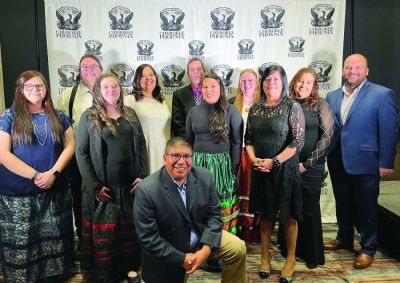Cherokee Phoenix continues to soar
Teri Saylor
Special to Publishers' Auxiliary
Jan 1, 2023


The legend of the mythical phoenix is one of rebirth and renewal. And in the Cherokee Nation, the storied Cherokee Phoenix newspaper has lived up to its name for nearly 200 years.
The Cherokee Phoenix, an independent community newspaper owned by the Cherokee Nation and published twice a month, is coming off a banner year in almost every area of publishing, from news coverage to circulation to awards.
The newspaper comes out in print and has a vibrant online presence with no paywall.
Executive editor Tyler Thomas is planted in both the journalism and the business sides, working closely with the assistant editor to oversee news coverage. He also manages his advertising team and stays on top of the newspaper’s budget.
“I work diligently with the finance team to make sure we are always where we need to be,” he said in a recent Zoom interview.
In addition to revenue generated through subscriptions and advertising, the Cherokee Nation supports the newspaper financially.
Thomas is a Cherokee Nation citizen, born and raised, his roots running deep within the tribe, which the largest Native American tribe in the United States with more than 440,000 citizens worldwide.
Over 141,000 of those Cherokee Nation citizens reside within the tribe’s reservation boundaries — an area comprised of 14 counties in northeastern Oklahoma.
It’s a vast community for a bi-weekly newspaper to cover with a staff of 12 people, including Thomas.
THRIVING THROUGHOUT A TUMULTUOUS HISTORY
The Cherokee Phoenix has been serving readers for 194 years. Its history is published on its website.
Launched on February 21, 1828, the Cherokee Phoenix was published in New Echota, Georgia, which was then the Cherokee Nation’s capital. The bilingual newspaper was published in both English and Cherokee. A year after it launched, its nameplate was extended to The Cherokee Phoenix and Indian Advocate.
In the 1830s, editor Elias Boudinot and Principal Chief John Ross used the newspaper to editorialize against the Indian Removal Act of 1830 and the growing encroachment and harassment of European settlers in Georgia. Financial troubles, coupled with a rampage by the Georgia Guard, which destroyed the press and burned the newspaper’s office, silenced the Phoenix for several years during the Trail of Tears era. In the ensuing decades of turmoil when state and federal governments attempted to dissolve native governments, the newspaper rose and fell until the 1970s, when the Cherokee Nation stabilized in its modern form.
“And then the newspaper came back but continued to struggle, mostly due to financial issues, before finally getting its footing in the ‘80s,” Thomas said.
In October 2000, the Tribal Council passed the Cherokee Independent Press Act of 2000, which ensures the coverage of tribal government and news of the Cherokee Nation is free from political control and undue influence, and by 2007, the newspaper had begun using the original Cherokee Phoenix nameplate.
Today, the newspaper reports on the tribe's government; current events; and Cherokee culture, people and history. The news organization has also broadened its outreach to include locally aired radio shows and social media.
While the Cherokee Nation owns the newspaper, the editors and reporters enjoy independent press freedom and protections from political influence, Thomas said.
“We have the freedom to operate as we see fit and report as we see fit, without the fear of being fired or reprimanded or anything like that,” he said.
Over the years, the Cherokee Nation has passed a reporter’s privilege, a Freedom of Information Act and other right-to-know laws. In addition, the newspaper enjoys the press freedom provided by the United States federal government and Oklahoma state laws.
DEEPLY ROOTED IN ADVOCACY
Published in print on the first and 15th of each month, you might say the Cherokee Phoenix is a community newspaper on steroids, committed to fiercely covering its vast community.
“We write a lot of stories that focus on our 14-county reservation, but with nearly a half million citizens worldwide, our coverage is expansive,” Thomas said. “We cover people that are doing amazing things everywhere, from the West Coast to the East Coast and even abroad.”
While the Phoenix has a broad geographic footprint, it is narrow in its scope of coverage, sticking to reporting on issues specific to the Cherokee Nation, Thomas said.
“We leave coverage of city and county government to the other local newspapers,” he said. “While some of our readers might find that coverage helpful, we simply don’t have the staff to do it.”
Readership is strong, running over 200,000, thanks to a boost by the Cherokee Nation, which used funding from the American Rescue Plan (ARPA) to purchase subscriptions for all Cherokee Nation households across the United States in 2022. Thomas expects circulation to drop in 2023, when the free subscriptions become premiums for readers who opt in to join a website that will link them to information about government services. Those who don’t opt in can purchase subscriptions.
In addition to the newspaper’s print circulation, web traffic runs anywhere from 80,000 to 100,000, Thomas said.
Harkening back to its advocacy roots, the newspaper has been reporting on and calling for the U.S. House of Representatives to seat Kimberly Teehee, the Cherokee Nation’s first delegate in history, a measure guaranteed in the 1835 Treaty of New Echota, enacted by the United States during the forced removal of the Cherokees from their homelands.
Principal Chief Chuck Hosking Jr. appointed Teehee in 2019. The House has had recent hearings on the matter, but as of December had not voted on seating her.
“It’s been little over three years now since Delegate Teehee was named, and the House finally had the hearing in November,” Thomas said. “There’s a lot of interest in it just because of the magnitude of the story. People near and far are very interested in it because it’s something that not only benefits Cherokee Nation; it benefits all of Indian country.”
And there has been a great deal of support from non-native people, too.
“I saw Pearl Jam tweet the other day in support of Delegate Teehee, and I think the actor, Mark Ruffalo, has tweeted in support of it,” Thomas said.
The Cherokee Nation delegate and other delegates representing the District of Columbia, Puerto Rico and four inhabited U.S. territories can hold ex-officio seats in the U.S. House. While they may be assigned to committees, can submit amendments to bills, and participate in floor debates, they cannot vote on laws.
“You’re seeing it on the local level and nationwide that many people want to see the government held to their word and uphold a promise that was made hundreds of years ago,” Thomas said.
The newspaper has also been a strong advocate for continued sovereignty of the Cherokee Nation, jurisdiction over its land and its ability to govern.
The newspaper has been closely monitoring a Supreme Court case on the constitutionality of the Indian Child Welfare Act. The law, established in 1978 and under threat today, enables Native governments to participate in child welfare cases involving Native children and prioritizes their placement with family or extended kin.
“It is an issue that can set a precedent that extends well beyond the Indian Child Welfare Act,” Thomas said. “It could extend to other sovereignty issues and how tribes operate and govern.”
SERVING A VAST COMMUNITY
The Cherokee Phoenix has a vast yet close-knit readership that Thomas compares to a family, and he believes future success lies in understanding readers. While the print version of the newspaper will always be its cornerstone, digital media will be its future, he says.
“Print is what we're known for, and it’s what our foundation is built upon,” he said “As technology continues to evolve, we have to evolve too, because we need to understand that while our 60-year-old citizens rely on the print copy for their news consumption, the 25-year-olds are gravitating to digital platforms and apps.”
No paywall, free subscriptions for readers and financial support by the owner certainly pave the way for success, but just like any other newspaper, the Cherokee Phoenix is not without its challenges — particularly with advertising in the post-pandemic economy. Thomas believes that support benefits readers in the end.
“We aren’t as out in the wind as some of the traditional non-native newspapers because we do have some security and support from tribal funding, so we haven’t had to deal with layoffs or anything like that,” he said. “And that benefits our citizens because we are able to give them the news they expect and that they need.”
Today, Thomas is celebrating a banner awards year. The newspaper was a finalist for Newspaper of the Year in the Great Plains Journalism Awards, was named as the best newspaper in Oklahoma’s SPJ awards and won first place for general excellence in the National Native American Journalist Association Awards.
“It’s always a good feeling whenever other organizations affirm our work,” he said. “I always say I have the best news team in the country. And I truly do believe that.”
For all the awards, subscription promotions and interesting news coverage, the history of the Cherokee Phoenix and its mission are never far from Thomas’ heart.
“It's an honor to know that we're here to serve a kind of dual purpose — playing historian as well as being the essential information source Cherokee Nation citizens and those in other tribes who visit our website or maybe subscribe to our newspaper,” he said. “We are the source that provides them the information they need so that they are informed of what is going on and how it affects them as Cherokee Nation citizens.”
Teri Saylor is a business writer in Raleigh, North Carolina. Contact her at terisaylor@hotmail.com.








